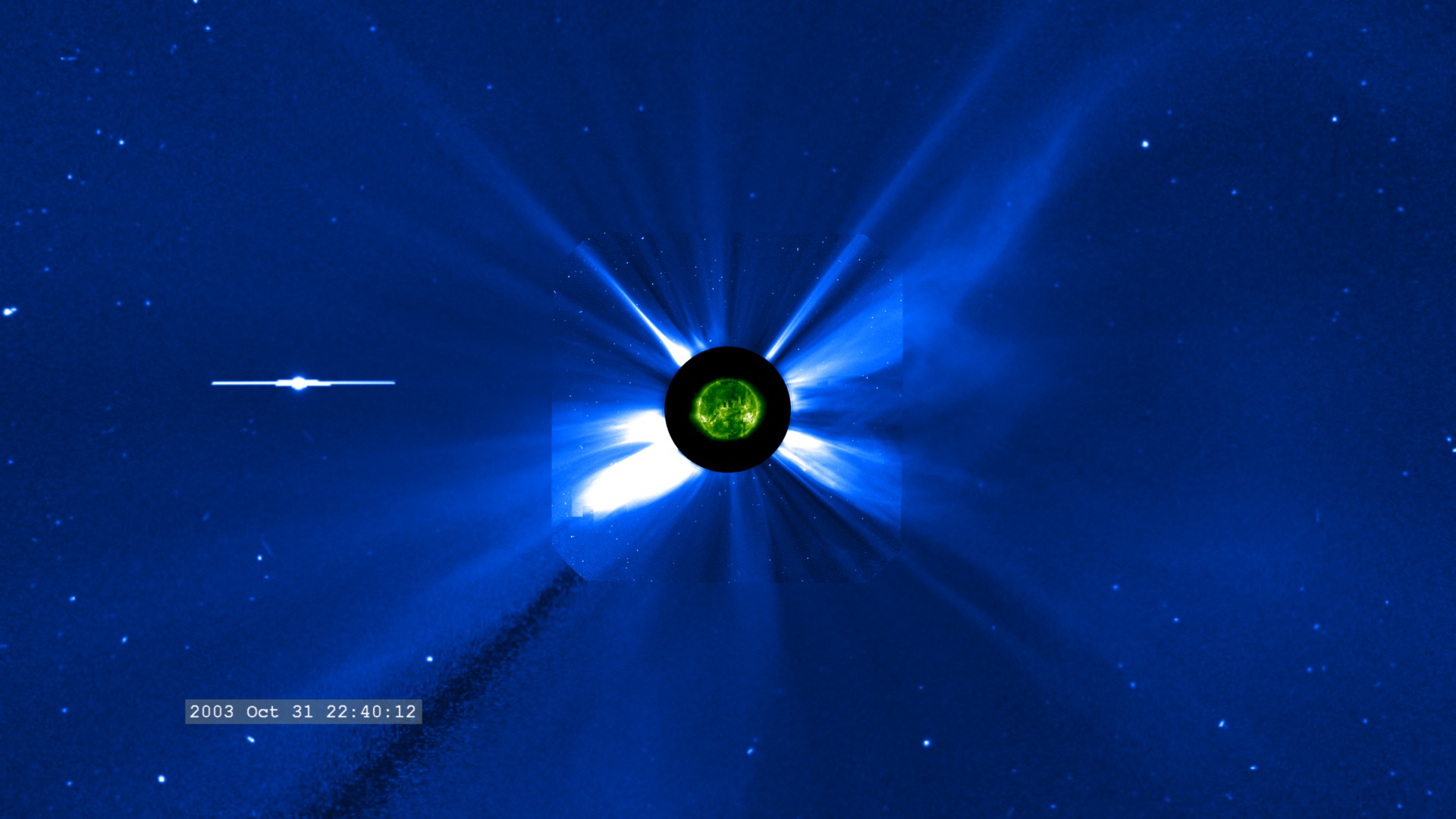Halloween Solar Storms - 2003
This is a 1024x1024 pixel version of solar storms providing a more complete view of the SOHO/LASCO/C3 field-of-view.
Here is a view of the solar disk in 195 Å ultraviolet light (colored green in this movie) and the Sun's extended atmosphere, or corona, (blue and white in this movie). The corona is visible to the SOHO/LASCO coronagraph instruments, which block the bright disk of the Sun so the significantly fainter corona can be seen. In this movie, the inner coronagraph (designated C2) is combined with the outer coronagraph (C3). This movie covers a two week period in October and November 2003 which exhibited some of the largest solar activity events since the advent of space-based solar observing.
As the movie plays, we can observe a number of features of the active Sun. Long streamers radiate outward from the Sun and wave gently due to their interaction with the solar wind. The bright white regions are visible due to their high density of free electrons which scatter the light from the photosphere towards the observer. Protons and other ionized atoms are there as well, but are not as visible since they do not interact with photons as strongly as electrons. Coronal Mass Ejections (CMEs) are occasionally observed launching from the Sun. Some of these launch particle events which can saturate the cameras with snow-like artifacts.
Also visible in the coronagraphs are stars and planets. Stars are seen to drift slowly to the right, carried by the relative motion of the Sun and the Earth. The planet Mercury is visible as the bright point moving left of the Sun. The horizontal 'extension' in the image is called 'blooming' and is due to a charge leakage along the readout wires in the CCD imager in the camera.
A 1Kx1K movie of the 2003 solar storms seem by SOHO.
Credits
Please give credit for this item to:
NASA/Goddard Space Flight Center Scientific Visualization Studio
-
Animator
- Tom Bridgman (Global Science and Technology, Inc.)
-
Producer
- Scott Wiessinger (USRA)
-
Scientist
- Holly Gilbert (NASA/GSFC)
Release date
This page was originally published on Thursday, September 20, 2012.
This page was last updated on Tuesday, November 14, 2023 at 12:02 AM EST.
Missions
This visualization is related to the following missions:Series
This visualization can be found in the following series:Datasets used in this visualization
-
LASCO/C2 (C2) [SOHO: Large Angle Spectrometric COronagraph (LASCO)]
ID: 160This dataset can be found at: http://sohowww.nascom.nasa.gov
See all pages that use this dataset -
LASCO/C3 (C3) [SOHO: Large Angle Spectrometric COronagraph (LASCO)]
ID: 161This dataset can be found at: http://sohowww.nascom.nasa.gov
See all pages that use this dataset -
SOHO/EIT 195 (195 Filter) [SOHO: Extreme-UV Imaging Telescope (EIT)]
ID: 477This dataset can be found at: http://sohowww.nascom.nasa.gov
See all pages that use this dataset
Note: While we identify the data sets used in these visualizations, we do not store any further details, nor the data sets themselves on our site.
